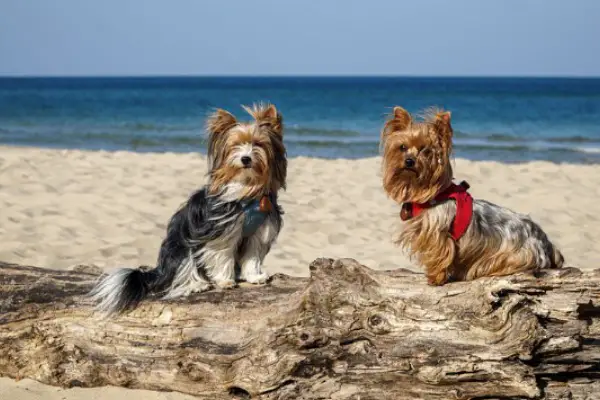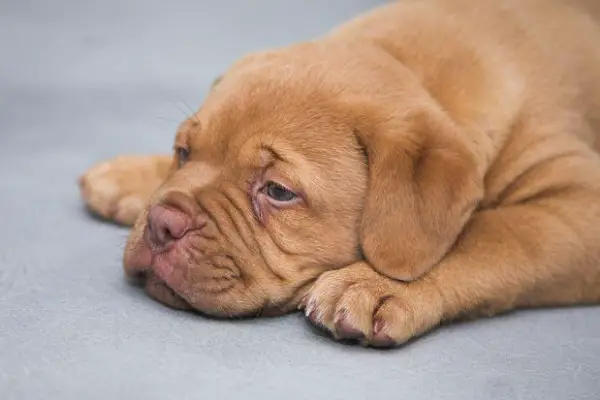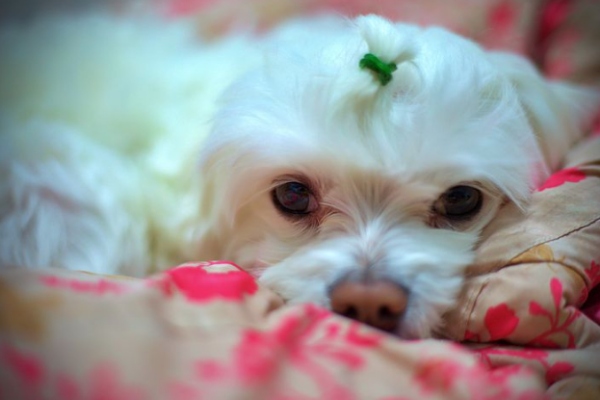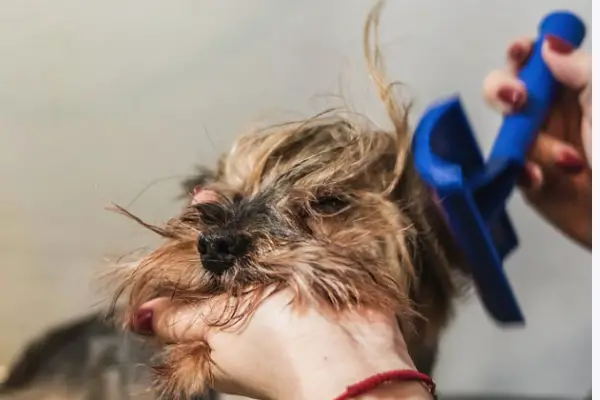9 Reasons Why Pug Smell So Bad
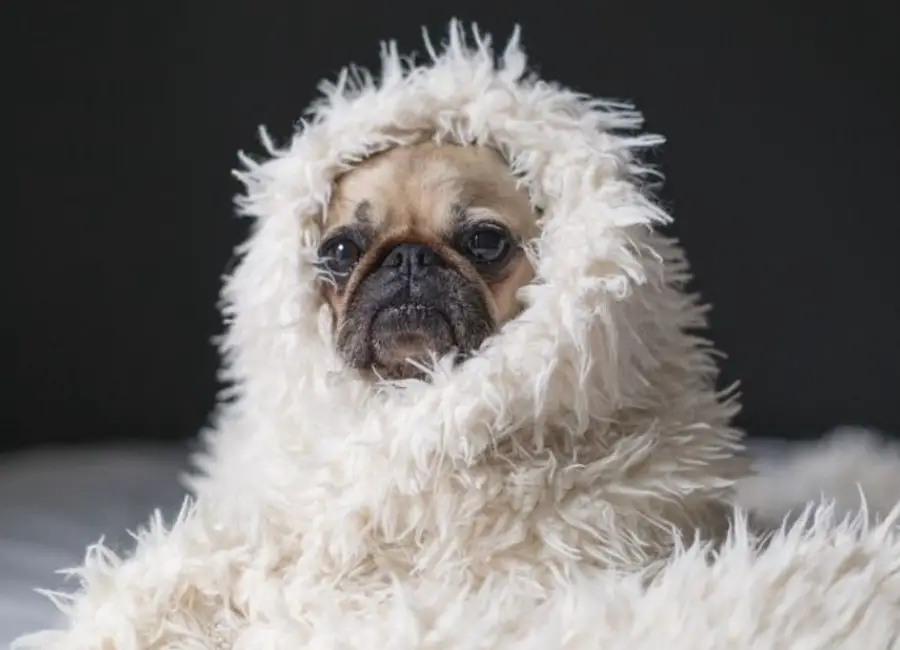
I always get this question about why pug smell so bad, and that is what we will discuss in this post.
Pugs smell for different reasons, most of which are attributed to their owners.
When compared to other canines without wrinkled coats, pugs are more likely to develop stinky due to their skin wrinkles.
Why Pug Smell So Bad
The most prevalent causes of pug odor include skin diseases, ear infections, dental difficulties, unclean coats and paws, yeast infection, and too many baths.
Let’s break it down further…
The following are the most typical causes of pug odor:
1. Dirty skin folds
Pugs are known for their unique skin folds, which can also become a problem if left dirty.
Dust, trash, and moisture are frequently caught in the skin folds of pugs, causing a variety of skin problems.
Bacteria thrive in the wrinkles of this pug’s skin, which may easily lead to illness.
Pugs have bulge eyes that allow tears to drop off into the skin folds on their face, if left unkempt, will allow growth of microorganisms.
To avoid this, you should always wipe your pug face wrinkles with a vet recommended wipe.
2. Skin Infections
Any unusual smell on your pug’s skin should be reported to your veterinarian as soon as possible, before it becomes a severe issue.
A moist, wet environment that encourages surface germs such as bacteria and yeast to overgrow on your small pal’s skin.
These species’ toxins cause irritation and inflammation, which leads to infection and a breakdown of the skin barrier.
Yeast bugs and ringworm are only two of the skin diseases that can irritate your pug’s skin severely.
While some of these bacteria may not produce smell directly, they do cause dry skin, which can result in smell.
3. Bad breath due to dental problems
Bad breath due to dental problems is one of the most prevalent reasons for a foul odor, especially in elderly pugs, is dental problems.
Plaque and tartar on the teeth cause bad breath, which also applies to pugs.
Brushing the teeth of your pug is just as important as brushing your own.
Raw bones are great for cleaning in pugs under close supervision since they are tiny and chewable.
If you smell a bad stench, consider taking your pig to the veterinarian for a thorough check-up and cleaning.
4. Keeping dirty paws
Pugs’ paws and skin can be harmed by yeast infections. It’s most often found in the paws, which are rarely cleaned by their owners.
If your pug stinks, it might be because of filthy paws or a yeast infection.
Pug’s sweat glands are also situated on her paws, she will begin sweating from her paws if she gets too hot or exercises.
The most obvious is that your pug may foot in dirt, rotten garbage, or even animal excrement whenever you go on a walk.
This is not to be confused with the cheesy stench that emanates from their paws on a regular basis; this is very normal.
5. Leaving pugs wet regularly
Due to the fact that certain Pugs have multiple coats, they may retain water or liquid after being bathed and not properly dried.
It’s possible that if the water or liquid isn’t dried well enough, germs will form and cause their skin to stink.
This characteristic odor comes from yeast and bacteria found naturally in a dog’s skin and fur.
When a pug gets wet, the generally mild odor intensifies dramatically as yeast and bacteria react to the water.
6. Infections of the ears
A healthy pug ear frequently has excellent defenses against pathogens if you clean up after your pug.
If your pug suffers from allergies or hormonal imbalances, yeast and bacteria levels can quickly grow, causing a foul odor.
Keep in mind that ear infections in pugs can be caused by a number of things, including: excessive dampness, Illnesses, mites, etc.
7. Infestations by yeast
Yeast infections are another common underlying condition that can generate an awful smell in pugs.
Despite the fact that yeast is not a typical skin inhabitant, it may grow in the right environment.
Yeast can be present in dark, moist regions like your pug’s skin folds or ears.
These infections are more frequent in pugs whose immune systems have been compromised, but they can strike any dog.
Medicated baths and oral treatment may be used if your veterinarian identifies a yeast infection.
If your pug has been diagnosed with yeast infection, be patient because this type of infection can continue for weeks or even months.
The paws and skin of the pug can be affected by yeast infections, causing them to smell.
8. Not bathing or excessive baths
The problem is that when you bathe your pug on a regular basis, the shampoo or cleansing chemicals can strip its skin of its natural oils.
Her coat will get greasy, irritate her skin, and eventually stink if she has too many of these oils in it.
Their natural oils clean her coat and keep it healthy, shiny, and odor-free.
Her body reacts by producing an unusually big amount of natural oil.
It may sound paradoxical, but giving her extra washes will make her dirtier and smellier.
It may sound paradoxical, but giving her extra washes will make her dirtier and smellier.
Pugs only need to be bathed four to seven times each year.
Read more: What Can Pugs Not Eat (13 Worst Food To Avoid).
9. Nutrition
Poor-quality food can cause indigestion, gas, and even diarrhea in your pug.
The meals that provoke this response are frequently prepared with a lot of fillers.
Rather, feed your pug nutritious, high-quality meals that will help him digest his food better.
A drastic change in their diet might also upset their stomach, resulting in flatulence issues.
If the new food causes an allergic response, it’s better to adjust it, depending on your veterinarian’s advice.
Read more: What Can Pugs Eat (21 Safe Foods For Pugs).
Ways to prevent your pug from smelling
The following are some typical methods for controlling or preventing pug from smelling:
- Brush your pug on a daily basis to keep shedding to a minimum.
- After each stroll, make sure your pug’s paws are clean.
- Check your pug’s ear for indications of infection on a regular basis.
- After 3 to 5 weeks, give your pug a bath.
- It’s never a good idea to let your pug get or remain wet.
- Brush your pug’s teeth at least once a week.
- Clean your pug’s lounging spots on a regular basis.
- Your pug will appreciate a washable dog bed.
- Only use veterinarian recommended shampoos that are safe for your pug.
- Doggy wipes should only be used on your pug when absolutely required.

![How to Clean Dog Ears [A Complete Step By Step Guide] How to Clean Dog Ears](https://petcreeks.com/wp-content/uploads/2023/09/Copy-of-Copy-of-Copy-of-Copy-of-Copy-of-Copy-of-Untitled-Design_20230924_164619_0000-768x555.jpg)
